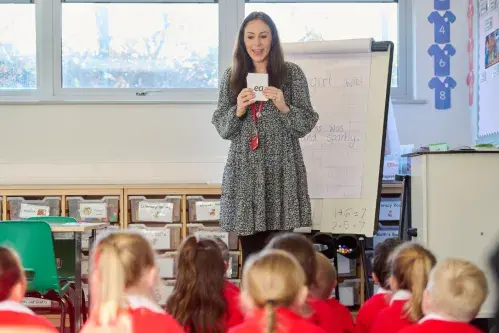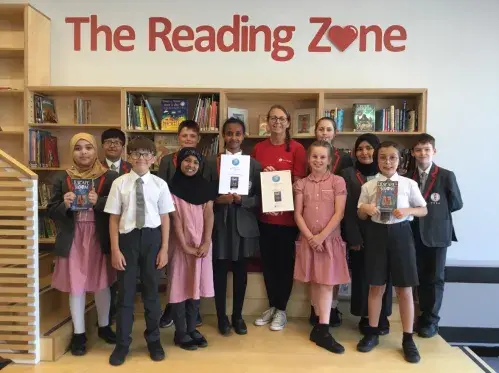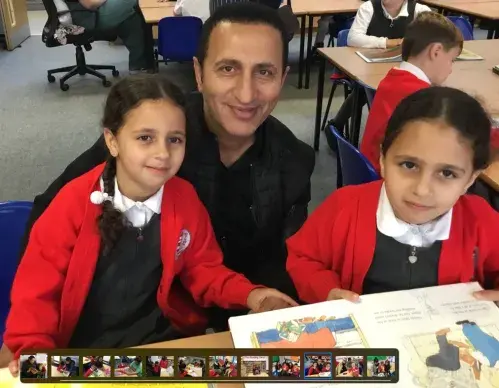
Why do we learn English?
Reading
At Ark Ayrton, our aim is to ensure that all children become highly skilled readers, working at or above the National Standard and also develop a love of reading, so that they become life-long readers. We aim to ensure that children have a balanced reading diet, comprising of fiction, non-fiction, poetry and classics, exposing them to the great literary writers both past and present. Reading is at the heart and soul of our curriculum and books drive and support learning. The rest of the foundation subjects stem from our School book spine and drive the organisation of our curriculum.
Writing
At Ark Ayrton Primary Academy, as books and reading are at the heart of our curriculum, writing is also very much driven by the whole class text studied in reading time. It is our intention to provide children with a high-quality education in English that will teach them to become enthusiastic and confident writers, who can write fluently, communicate their ideas effectively and be able to access and interact with the world around them.
It is also our aim that every child should develop a fluent, legible and personalised style of handwriting by the time they leave the Academy in Year Six. Capital and lower case letters should be formed appropriately and the letter size and shape should be consistent. As an Academy, we fully acknowledge that handwriting is not a natural skill; rather it is a motor activity which needs to be taught explicitly through teacher modelling and children practising. Therefore, we provide opportunities for all children to develop, practise and perfect the skills of handwriting. Alongside this, we also provide targeted support to any child, who has been identified as experiencing difficulties.
We believe a successful primary writer:
- is passionate about writing, as a craft whereby they can write fluently, communicating their ideas effectively and is able to access and interact with the world around them.
- develops an awareness of audience, purpose, and format
- uses an increasingly wide knowledge of vocabulary and grammar
- practises, uses, and applies cursive handwriting
- understands that writing is a journey, whereby editing and improving their writing is part of an author’s skillset
- is provided with the skills to successfully edit and improve their writing, with a large emphasis on the impact of the reader
- is exposed to writing taught in a cross curricular way, which links to knowledge being taught in other curriculum areas
- is prepared for the next stage in their education and leaves us being able to write confidently and communicate effectively
- is supported effectively to write at a high standard, regardless of their individual starting point
Our approach to reading
|
At Ark Ayrton Primary Academy, we believe that reading is an essential life skill and we are committed to enabling our children to become lifelong readers. Reading is a skill that enables children to successfully access their learning across the wider curriculum and lays the foundations for success in later life both in school and beyond. Books and reading are at the heart of our curriculum. We have recently relocated and refurbished our library to ensure it is the heart of our community and always accessible to both pupils and parents. All children have access to high-quality books which build vocabulary and broaden knowledge. Reading is the heart and soul of our curriculum. Books are used to drive and support learning. A successful primary reader: -develops a love of reading to become life-long reader -has a balanced reading diet, comprising of fiction, non-fiction, poetry and classic, exposing them to the great literary writers both past and present -has a diverse book spine spanning from the foundation stage through to year 6 -applies their word reading and comprehension skills in a wide variety of curriculum subject areas -participates in daily SURF (silent, uninterrupted reading for fun) to develop a habit of reading for pleasure and information -builds on their early reading skills, as this is fundamental in them becoming readers -are exposed to silent reading, reading out loud and listening to an adult read -understands the importance of being able to read |
Reading across the Curriculum
At Ark Ayrton, our Horizons curriculum is based around a book and additional whole class reading time in the afternoon drives the topic, science and other curriculum areas. All children are actively encouraged and provided with opportunities to apply their skills of reading to all subject areas. For example, in our weekly PE lessons, children read an article relating to the sport they are going to play. In Science, children read about famous scientists and the discoveries which they have made.
Support for Readers
At Ark Ayrton, we believe that every child regardless of reading ability should have the opportunity to be exposed to different types of texts and authors, otherwise the gap widens and children begin to not see themselves as readers. Therefore, we will never take children out for reading intervention during class reading time in both the mornings and afternoons. We provide additional time for Reading interventions delivered by the class TA at some point during the afternoon. All children across the school from year 1 to year 5 attend an additional phonics or reading fluency interventions four times a week.
|
In addition to our reading curriculum, we provide enrichment through: -author visits in school -trips to our local library -workshops -participating in national reading themed events; World Book Day, National Storytelling Week, National Poetry Day |
Our approach to writing
Impact
The impact of our writing curriculum is measured and assess through children’s independent writing: the knowledge and skills they have retained and can apply. The children will be creative writers with a passion for English.
In order to measure success we:
- assess each individual piece of independent writing against the teacher assessment framework for each year group to identify successes and children’s next steps
- assess responses to questioning during every lesson
- look at the application of previous taught skills in pieces of writing
In addition to our Writing curriculum, we provide enrichment through:
- trips and visits linked to the children’s learning
- visitors
- workshops
Our writing journey
As books and reading are at the heart of our curriculum, writing is also very much driven by the whole class text studied in reading lessons in order to ensure that children have the knowledge needed to be able to write in different contexts. It is from this text that children use as a stimulus for writing. We strongly believe that writing is a journey and teachers use their understanding of each child, knowing what skills and knowledge have been previously taught to start planning for each new unit. Teachers will then create lesson plans which will ensure that any gaps in the sequencing of knowledge and learning are addressed. We are fully aware of the importance of children writing independently and therefore children write about something different to the teacher, to ensure they take ownership and independence over their writing and ideas. Once the children have crafted their piece of writing, they are provided with the skills of how to successfully edit and improve their creations, with a large emphasis on the impact of their writing on the reader.
As leaders, we made the conscious and deliberate decision, following research into writing, to ensure our writing journey, for both fiction and non-fiction, give children the opportunity to plan, draft, revise and publish their own creations. During each writing unit, children are taught grammar skills that link explicitly with the unit and see the grammar modelled clearly within the genre and content of the unit.
We understand how important it is for children to be exposed to high quality modelled texts. During every writing journey, children receive modelled and shared writing with their teacher. The teachers craft their own version of the fiction or non-fiction genre which is written to a high quality and includes the ‘think-aloud’ for sharing of grammar purposes, reasons for certain language choices and the effect words and phrases would have on the reader. Teachers use the ‘think-aloud’ to explain reasons for language choices, remind children about the expectations of punctuation used and recapping how to use any grammar skills within the sentence. From research, we understand the importance of this, which is why it features in every writing journey.
Our writing journey varies from a 3-4 week unit depending on the text type, genre of writing and stage of the child within the school. The writing journey will look different for a KS1 child to a KS2 child.
Writing area in the Library
As a school, it is imperative to us that children understand the relationship between reading and writing. We cannot have amazing books to read if there is no one to write them!
Handwriting
At Ark Ayrton, we teach children cursive handwriting. Please see our handwriting policy for the progression in joins. In every year group, children have the opportunity to achieve their bronze award, silver award and then finally their gold award in handwriting to receive their pen licence, or pencil licence if they are in EYFS or Year 1.
At Ark Ayrton, we teach the children to master their letter formation by ensuring consistency in shape and size before moving them on to cursive handwriting when they are ready. In Reception, the children are taught ball and stick and then gradually introduced to cursive joins once letter formation is secure and the individual child is ready to progress. Handwriting is taught explicitly in short, frequent sessions, whereby it is modelled by the teacher. In EYFS and KS1, it is linked to phonics, which help children to form ‘muscle memorys’ linking sounds to handwriting. KS2 children practice their handwriting in their class literacy books in order to reinforce the consistent high expectations of their handwriting: KS1 and EYFS practice in their Read, Write Inc books.
Spelling
At Ark Ayrton, spellings from the National Curriculum are explicitly taught and shared on a Friday and tested on the following Friday. These weekly spellings are taught and practised daily for 15 minutes through a series of different activities; word searches, sentence dictation, LCWC (Look Cover Write Check), sentence writing with a word bank and unscramble the words. Spelling homework also goes home on a Friday and is due in on a Friday. Spellings are assessed on a weekly and half termly basis.
Year 1
Reading
| Autumn 1 | Autumn 2 |
|---|---|
| RWI | RWI |
| Spring 1 | Spring 2 |
|---|---|
| RWI | RWI |
| Summer 1 | Summer 2 |
|---|---|
| RWI | RWI |
Writing
| Autumn 1 | Autumn 2 |
|---|---|
|
Sentence writing based on books by J. Donaldson |
Sentence writing based on Traction Man and Whatever Next |
| Spring 1 | Spring 2 |
|---|---|
| Sentence writing based on books about castles and knights | Sentence writing based on books about dinosaurs |
| Summer 1 | Summer 2 |
|---|---|
|
Sentence writing based on books about the seaside |
Sentence writing based on books about animals and plants |
Year 2
Reading
| Autumn 1 | Autumn 2 |
|---|---|
|
RWI The Baker's Boy and the Great Fire of London by T and T. Bradman Toby and the Great Fire of London by M. Nash |
RWI Pojo Blows the Gunpowder Plot by T. Meers and N. Dennis The Jungle Book by R. Kipling (abridged version) |
| Spring 1 | Spring 2 |
|---|---|
| The Secret Garden by F. H. Burnett Fantastic Mr. Fox by R. Dahl |
The Secret Garden by F. H. Burnett Fantastic Mr. Fox by R. Dahl |
| Summer 1 | Summer 2 |
|---|---|
|
Peter Pan Betsey Biggalow is Here by M. Blackman |
The Iron Man by T. Hughes |
Writing
| Autumn 1 | Autumn 2 |
|---|---|
|
Sentence writing based around traditional tales |
Sentence writing based around traditional tales |
| Spring 1 | Spring 2 |
|---|---|
|
Sentence writing based on books about the world and explorers |
Sentence writing based on books about space |
| Summer 1 | Summer 2 |
|---|---|
|
Information writing about Flanimals Story writing based on The Night Pirates |
Information writing about The Most Important Animal of All Story writing based on Charlie and the Chocolate Factory |
Year 3
Reading
| Autumn 1 | Autumn 2 |
|---|---|
| Time Hunters ‘Stone Age Rampage’ by C. Blake | The Whispering Stones by S. Pirotta |
| Spring 1 | Spring 2 |
|---|---|
| Selection Greek Myths | Selection Greek Myths |
| Summer 1 | Summer 2 |
|---|---|
| Time Hunters ‘Egyptian Curse’ by C. Blake | The Time-Travelling Cat and the Egyptian Goddess by J. Jarman |
Writing
| Autumn 1 | Autumn 2 |
|---|---|
|
Narrative Information text (Guide to the Stone Age) |
Remembrance Poetry Recount - Diary entry (non-fiction) Informal letter writing |
| Spring 1 | Spring 2 |
|---|---|
|
Narrative based on a Greek Myth
|
Descriptive writing Information text |
| Summer 1 | Summer 2 |
|---|---|
|
Narrative |
Diary writing Instructions |
Year 4
Reading
| Autumn 1 | Autumn 2 |
|---|---|
| Boy at the Back of the Class by O. Q. Rauf |
Boy at the Back of the Class by O. Q. Rauf
|
| Spring 1 | Spring 2 |
|---|---|
| Escape from Rome by C. Lawrence |
Escape from Rome by C. Lawrence Romans on the Rampage by J. Strong |
| Summer 1 | Summer 2 |
|---|---|
| Viking Boy by T. Bradman | Viking Boy by T. Bradman |
Writing
| Autumn 1 | Autumn 2 |
|---|---|
|
Setting description |
Diary writing Narrative |
| Spring 1 | Spring 2 |
|---|---|
|
Narrative Information text |
Letter writing |
| Summer 1 | Summer 2 |
|---|---|
|
Narrative Diary writing |
Information text |
Year 5
Reading
| Autumn 1 | Autumn 2 |
|---|---|
| First Blood: ‘Spy Master’ by J. Burchett and S. Volgar |
A Midsummer Night's Dream by W. Shakespeare (abridged version) Julius Caesar by W. Shakespeare (abridged version) |
| Spring 1 | Spring 2 |
|---|---|
| Street Child by B. Doherty |
Oliver Twist by C. Dickens (abridged version) Tale of Two Cities by C. Dickens (abridged version) |
| Summer 1 | Summer 2 |
|---|---|
| Armistice Runner by T. Palmer | Armistice Runner by T. Palmer |
Writing
| Autumn 1 | Autumn 2 |
|---|---|
|
Narrative Biography |
Setting description Character description |
| Spring 1 | Spring 2 |
|---|---|
|
Diary entry Letter writing |
Information text Descriptive writing |
| Summer 1 | Summer 2 |
|---|---|
|
Narrative Information text |
Newspaper report |
Year 6
Reading
| Autumn 1 | Autumn 2 |
|---|---|
| Goodnight Mister Tom by M. Magorian | Goodnight Mister Tom by M. Magorian |
| Spring 1 | Spring 2 |
|---|---|
|
Anne Frank by M. Pressler (abridged version) SATs Revision – test style questions |
SATs Revision – test style questions |
| Summer 1 | Summer 2 |
|---|---|
| SATs Revision – test style questions | SATs Revision – test style questions |
Writing
| Autumn 1 | Autumn 2 |
|---|---|
|
Setting description Information text |
Narrative |
| Spring 1 | Spring 2 |
|---|---|
|
Diary entry |
Newspaper writing Explanation text |
| Summer 1 | Summer 2 |
|---|---|
|
Narrative Persuasive letter |
Redrafting and editing |
English News

Years 1 & 2 Author visit at Victoria Park
Pupils in Years 1 and 2 visited Victoria Park this week for a book event! Unfortunately, author Nick Sharratt was unwell and not able to attend, but the children were very lucky to have a storyteller from Portsmouth Central Library who read Nick’s book ‘Shark in the Park’. All the children really enjoyed joining in with the story and they finished the event with a picnic lunch before returning to school.
Every child received a FREE, signed copy of Shark in the Park! Thank you to Portsmouth Public Libraries and School Library Service.

Year 5 Book Awards
This year at the Year 5 Book Awards, our lovely Miss Pullen won the ‘Inspiring Adult Award’. This was in recognition of her dedication to helping our children become life long readers. These are just a few comments from our children:

